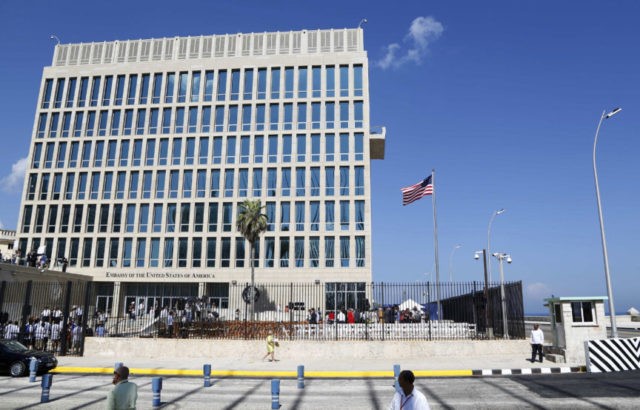The U.S. State Department confirmed Thursday that a 26th person suffered adverse health effects of unknown origin at the American embassy in Havana, Cuba. The Cuban government condemned Washington for publicizing the incident, while Cuban state media insisted the reports are “not real.”
The State Department refers to the incidents that have caused the health effects – which a study published in the Journal of the American Medical Association identified as mild brain damage and concussion-like symptoms – as “attacks.” The only confirmed incident similar to those in Cuba documented abroad occurred in Shanghai, China. Canadian diplomats have also suffered adverse health effects in Cuba, despite Prime Minister Justin Trudeau’s close personal relationship with the Castro regime.
The State Department has not provided any information indicating what is causing these harmful health effects on diplomats and their families or who may be orchestrating the attacks but has condemned the Cuban Castro regime for not doing enough to prevent them.
The Cuban government has repeatedly insisted that no such attacks have occurred, referring to them as “science fiction.”
In a statement Thursday, the State Department said that they could confirm two new cases that “result from a single occurrence in late May in a diplomatic residence in which both officers were present.” The department revealed last week that one person had been injured in an incident in May. Authorities say these two cases are the only ones confirmed to have occurred after August 2017.
The number of Americans now affected by similar health effects in Cuba is 26. The health and well-being of our personnel remains our top priority here at @StateDept, and we continue to work diligently to determine the cause of the symptoms, as well as develop mitigation measures. pic.twitter.com/sgXvEjEE1p
— Heather Nauert (@statedeptspox) June 28, 2018
The Cuban Foreign Ministry replied to the news by accusing Washington of “opportunism,” rather than offering help in examining the causes of the issue. “The supposed concern for health and security is used with political opportunism,” Cuba’s director of American affairs for the Foreign Ministry Carlos Fernandez de Cossio said in response, according to leftist Latin American propaganda outlet Telesur.
On Tuesday, shortly following the news of a 25th victim of attacks but two days before the 26th, the official newspaper of the Cuban Communist Party, Granma, published a story dismissing the attacks as “not real.” Titled “A Repeated Falsehood Does Not Become True,” the story claims the attacks on U.S. diplomats “would be funny if the situation was not so serious and ill-intentioned.
“For those who for months have closely followed this issue … it is evidence that the given incidents were not real and in the background there has always been a great political motivation, something like a well-orchestrated theater to attack the image of Cuba as a safe, stable, pacific country,” Granma railed. “Lack of reason and senselessness has followed since its beginning the so-called acoustic ‘attacks’ against American diplomats in Havana.”
“Cuba has reiterated that there is no scientific proof that explains the symptoms described by the allegedly affected,” Granma concludes, adding that Cuba has repeatedly requested access to the victims without American supervision and, to protect the safety of the individuals, been denied.
The official Cuban investigation into the incidents found that American diplomats were exposed to cicada and cricket noises and assumed that, as Americans, they were not accustomed to the noises of tropical insects and developed paranoia. The Castro regime provided no legitimate scientific data for this conclusion.
The State Department has never referred to the attacks as “acoustic” or confirmed the many reports by major American news outlets that shrill sounds accompanied the subsequent symptoms. University of Pennsylvania researchers responsible for the JAMA study concluded, however, that the symptoms present in the patients could not “have been consciously or unconsciously manipulated” by political desire to hurt the Cuban regime or subconscious fears, noting that most patients actually tried to downplay the symptoms to go back to work, but doctors found many too severe to immediately allow that.
Among the list of symptoms is hearing loss, memory loss, sleep impairment, and mobility issues.

COMMENTS
Please let us know if you're having issues with commenting.